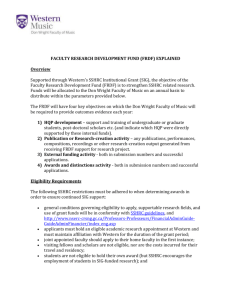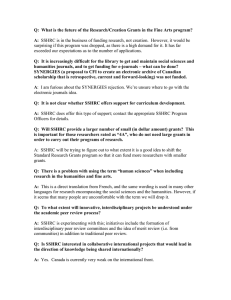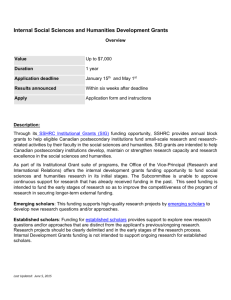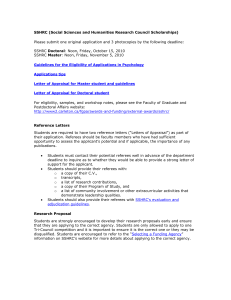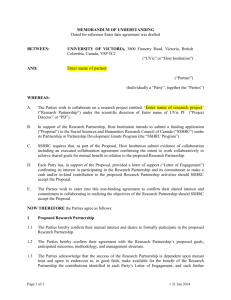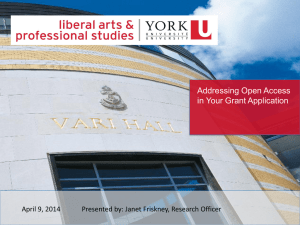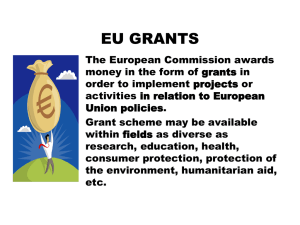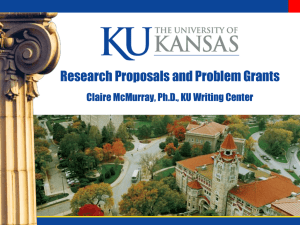FACULTY RESEARCH DEVELOPMENT FUND (FRDF) Guidelines
advertisement
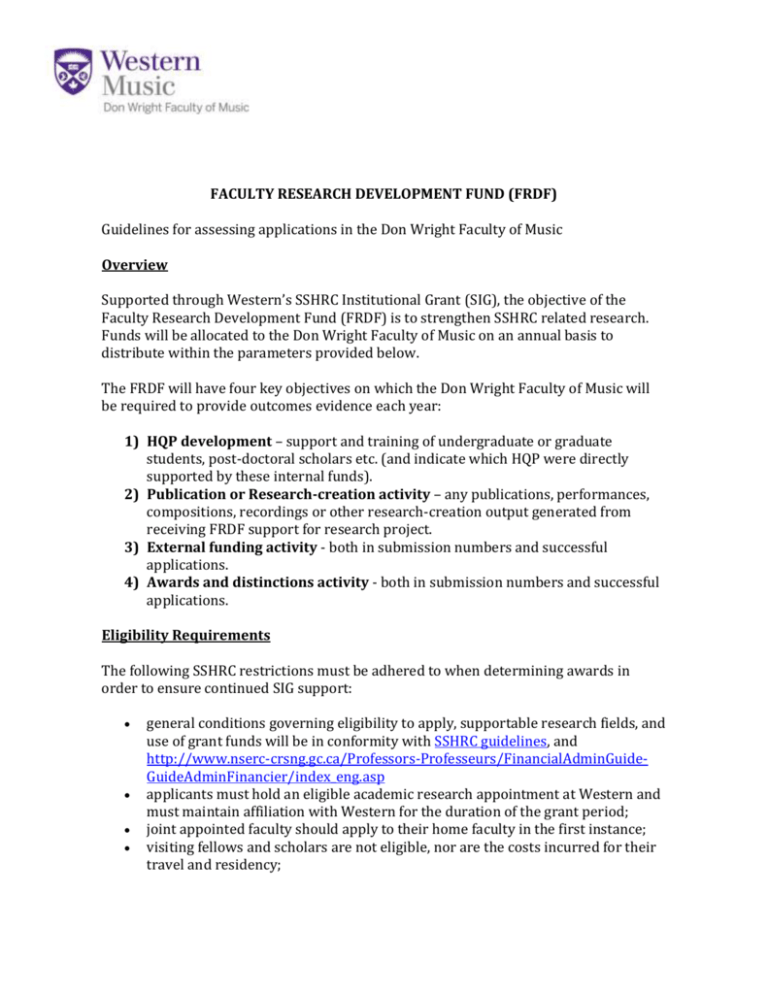
FACULTY RESEARCH DEVELOPMENT FUND (FRDF) Guidelines for assessing applications in the Don Wright Faculty of Music Overview Supported through Western’s SSHRC Institutional Grant (SIG), the objective of the Faculty Research Development Fund (FRDF) is to strengthen SSHRC related research. Funds will be allocated to the Don Wright Faculty of Music on an annual basis to distribute within the parameters provided below. The FRDF will have four key objectives on which the Don Wright Faculty of Music will be required to provide outcomes evidence each year: 1) HQP development – support and training of undergraduate or graduate students, post-doctoral scholars etc. (and indicate which HQP were directly supported by these internal funds). 2) Publication or Research-creation activity – any publications, performances, compositions, recordings or other research-creation output generated from receiving FRDF support for research project. 3) External funding activity - both in submission numbers and successful applications. 4) Awards and distinctions activity - both in submission numbers and successful applications. Eligibility Requirements The following SSHRC restrictions must be adhered to when determining awards in order to ensure continued SIG support: general conditions governing eligibility to apply, supportable research fields, and use of grant funds will be in conformity with SSHRC guidelines, and http://www.nserc-crsng.gc.ca/Professors-Professeurs/FinancialAdminGuideGuideAdminFinancier/index_eng.asp applicants must hold an eligible academic research appointment at Western and must maintain affiliation with Western for the duration of the grant period; joint appointed faculty should apply to their home faculty in the first instance; visiting fellows and scholars are not eligible, nor are the costs incurred for their travel and residency; students are not eligible to hold their own award (but SSHRC encourages the employment of students in SIG-funded research); and Award value must not exceed $7000 and must support scholarly activity in the humanities and the social sciences; such as short-term research projects, research-related conference travel (including international travel) and the holding of small seminars. The Faculty of Music will offer two competitions each year through the FDRF: 1. Conference/Research-creation travel grants (replacing SSHRC internal travel grants) 2. Small Grants (replacing SSHRC internal small grants program but not SSHRB internal strategic funding program) General guidelines two rounds per annum of $7,000 pots will be allocated to the Conference /Research-creation Travel Grants (Maximum individual annual award $2500 during a single fiscal year (May 1 – April 30)) one round per annum of $6,000 will be allocated to the Small Grants one round of Conference/Research-creation Travel Grants to run in July (September for 2013 only) and the second round of Conference / Researchcreation Travel Grants to run in January annually. One round of Small Grants to run in July (September for 2013 only) annually. The maximum total amount of award funds to be held by an individual in any one year may not exceed $7000. Conference/Research-Creation Grants The paper / composition/performance must be accepted for presentation. Note: for 2013/14 only applications can be submitted for travel already completed (6 month window). Factors that will be weighted positively international conferences or research-creation events (held outside of Canada) support for HQP new scholars significant engagement(s) with the conference (keynote speaker, on the organizing committee, multiple papers etc.) or artistic event CV – especially funding and publication record (with seniority taken into account) or research-creation scholarly equivalent e.g. recording, performing/conducting engagements, commissions impact on field Factors that will receive a negative weighting the applicant currently holds external funds that might be expected to support costs paucity of evidence for previous attempts to obtain external funding (which is why the grant applications denied section is there) large number of previous internal grants not filling the form out correctly or not complying with all instructions Small Grants Small Grants are intended to strengthen SSHRC –related research. Successful applicants will be encouraged to publish or produce equivalent research-creation outputs such as recordings or compositions and to submit an external funding proposal to SSHRC by the conclusion of the award. Factors that will be weighted positively (not all factors need be present in any one application) international component collaborative component support for HQP new scholars evidence of previous attempts to obtain external funding 4A status CV – especially publication and funding record or research-creation equivalent e.g. recording, performing/conducting engagement, commissions (with level of seniority taken into account) impact on field Factors that will receive a negative weighting the applicant currently holds any internal funds OR holds external funds that relate to the research project being proposed paucity of evidence for previous attempts to obtain external funding (which is why the grant applications denied section is there) large number of previous internal grants not filling the form out correctly or not complying with all instructions SSHRC definitions of relevance Artistic discipline: Any one, or any combination of, the following categories: architecture, design (including interior design), creative writing, visual arts (painting, drawing, sculpture, ceramics, textiles), performing arts (dance, music, theatre), film, video, performance art, interdisciplinary arts, media and electronic arts, and new artistic practices. Artist-researcher: An individual whose work involves research and the creation of works of art. Their work may include the training and mentoring of students and postdoctoral researchers. Individuals holding grants must be affiliated with an eligible Canadian institution Research-creation: An approach to research that combines creative and academic research practices, and supports the development of knowledge and innovation through artistic expression, scholarly investigation, and experimentation. The creation process is situated within the research activity and produces critically informed work in a variety of media (art forms). Research-creation cannot be limited to the interpretation or analysis of a creator’s work, conventional works of technological development, or work that focuses on the creation of curricula. The research-creation process and the resulting artistic work are judged according to SSHRC’s established merit review criteria. Fields that may involve research-creation may include, but are not limited to: architecture, design, creative writing, visual arts (e.g., painting, drawing, sculpture, ceramics, textiles), performing arts (e.g., dance, music, theatre), film, video, performance art, interdisciplinary arts, media and electronic arts, and new artistic practices.
